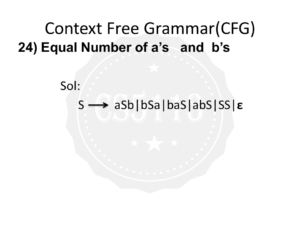Context Free Grammar for an Equal Number of a’s and b’s | CFG for an Equal Number of a’s and b’s
OR
To construct a context-free grammar (CFG) for the language , we need a grammar that generates strings where the number of ‘s and ‘s are equal, without any specific order constraints.
CFG Construction
Here’s a CFG that generates such strings:
Start Symbol:
Production Rules:
S→aSb∣bSa∣ϵ
Explanation of the Rules:
1. :
- This rule adds an to the beginning of the string and a to the end of the string, maintaining the balance of ‘s and ‘s. The string between these added and must also have an equal number of ‘s and ‘s, which is handled recursively by .
2. :
- This rule is similar to the previous one but adds a to the beginning and an to the end. This also maintains the balance of ‘s and ‘s.
3. :
- This rule allows for the empty string, which trivially has equal numbers of ‘s and ‘s (both counts are zero).
Example Derivations:
For the string :
- Now, must derive to something with equal ‘s and ‘s. Using again:
- Next, we need :
- So, combining these, we get: + .
For the string :
- For :
- Then must be :
- So, combining these, we get: + + + .
This CFG correctly generates all strings where the number of ‘s equals the number of ‘s.












